You are currently browsing the category archive for the ‘Climate’ category.
It’s Blog Action Day today and in occasion of this year’s subject; Climate Change, I do 30 would like to tell you about a very cool climate change initiative by Danish Company Grundfos.

As you already know, I do 30 wants to show the world leaders that we all care about the environment and that we want more climate friendly choices. And so does Grundfos.
With their campaign Future Now, Grundfos encourages everybody to sign an online petition to make the politicians sign the Copenhagen protocol at COP15 in December. The goal is to give Danish Minister of Climate and Energy, Connie Hedegaard and the other world leaders 15,000 signatures along with 1,000 videos showing regular people giving their advice for a greener planet. The videos will show that people are proud to lend their names and faces to the battle against climate change.

We can all do something to prevent climate change. Companies can help spread the word about climate change through campaigns like I do 30 or Future now, but we as consumers can also make our voices heard buy joining these campaigns – do our laundry at 30 and upload videos with our advice for at better climate.
So why not go to Future Now and upload your video and sign the petition?
This blog post is a part of Blog Action Day 2009 where more than 6,000 bloggers in 135 countries write about climate change today the 15th of October. Blog Action Day will reach more than 10,000,000 readers around the world with messages expressing support for finding a sustainable solution to the climate crisis. You can see more about the project here.
Our hope is that initiatives like Blog Action Day, Future Now and I do 30 will create awareness about climate change and all the little things we can do to make our planet a better place and that it will convince the world’s leaders to create an ambitious climate agreement when they meet in Copenhagen in December.
We think bloggers can help change the world.
In the old days there were only a few media available and you had to be very lucky to get your 15 minutes. Today everybody has the opportunity to reach the whole world – fast!
A blog is a fantastic media and everybody can be his or her own editor. Luckily many of these editors want to spread the word about good causes.
I do 30 has experienced a wonderful support from bloggers already. Even if it’s just mentioning the simple message:
Try to wash your clothes at 30 degrees. Not because it’s good for your electricity bill, but because it will help save many tons of CO2. I do 30 – do you?
In the first few weeks these lovely bloggers helped us spread the word:
blomcd.blogspot.com, facebook.com/Trendoutlet, ilovebeauty.dk, anywho.cover.dk, mylittlestream.se, 7inch.dk, lyndaevans.blogspot.com, bondam.dk, munichmarty.livejournal.com.
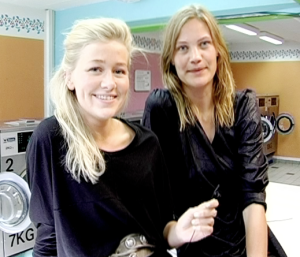 Elise Born and Ingrid Munch, two of the three bloggers behind the blog anywho.dk
Elise Born and Ingrid Munch, two of the three bloggers behind the blog anywho.dk
Do you have a blog? Or know someone who does? Then we would love if you’d spread the word. Or encourage people to show their support by joining our Facebook page: Facebook.com/ido30 – we really think this can make an impact and we appreciate any help.
And remember that a Facebook profile is also a powerful media. So don’t hesitate to share I do 30 via updates, wall posts, invites etc…
Shoppers in Magasin and H&M in Copenhagen will find a little something in their shopping bags these days: an I do 30 flyer giving them washing tips and encouraging them to join I do 30 on Facebook. We decided to hit the shops and take the temperature on how the flyer was received.

In Magasin we met Stine Siedelmann who already does her laundry at 30 °C to take care of the environment, but also because it takes better care of her clothes. She told us that she gets really annoyed when friends, who borrow her clothes, wash them at higher temperatures, because the clothes then come back looking worn and shabby. Stine thought it was a really good idea to spred the I do 30 message in the shops so more people would know about it.
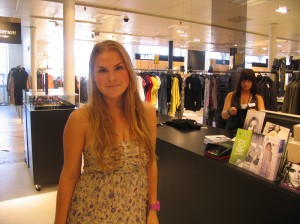
Coming out of H&M we met Jeanett Mortensen and Jeanne Loenstrup who were both carrying H&M bags. We asked them to look for the flyer in the bag and tell us what they thought about it. Jeanett already knew everything about I do 30 because she saw us at Roskilde Festival, so she explained everything to her friend. The girls loved the initiative and said that they’d join it on Facebook straight away – but they did have a problem; the washing machine at their Laundromat will only go down to 40 °C, so maybe it’s time to start looking for another one…

Every February and every August, Copenhagen is host to Northern Europe’s largest fashion event: Copenhagen Fashion Week. This year I do 30 will be there.
What better place to spread the message about climate friendly washing habits? No matter how fashionable you dress, you’ll need to wash your clothes, right?
I do fashion
From designers to stylists there is no question: 30°C is enough for most of your clothes! It makes a huge difference for the climate and in many cases it will protect and prolong the quality of the fabrics too. This is the message that famous designers such as Mads Norgaard, Susanne Rützau and Naja Munthe along with the well-known fashion names Uffe Buchard, Anywho and Eva Kruse will help I do 30 spread.
Interviews on I do 30
During Copenhagen Fashion Week I do 30 will interview the fashion crowd and bring you their views on 30-degree washing. These interviews will be posted on the I do 30 Facebook page and on YouTube, so keep your eyes and ears open.

An alternative to saving CO2 by washing at 30 °C is to take your bike instead of using your car. At Roskilde, one of the many initiatives was bicycles placed at the Climate Community, where you could bike and recharge your mobile phone at the same time.
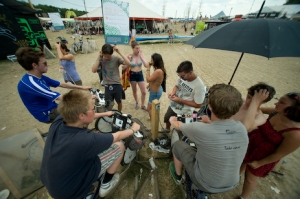
We bumped into Hans and August who were cycling for their life to recharge their mobile phones :). They both thought it was cool to be able to recharge phones themselves, as it felt like a bit of a luxury to be able to ‘bike their way to energy’ as they didn’t have to queue up in the hot weather and stand there and wait to hand their phones to someone else, and then having to go back and pick them up later.
August said he had always been a little aware of making the small changes in order to be environmentally friendly such as turning off the light when leaving the room, biking to work etc., but he said that whenever he took his car to work/gym, he felt really bad about it, because compared to biking there, it produced a lot of unnecessary emissions, and that both he and Hans tried to limit the use of their cars.
August and Hans thought the environment issue was a good theme for the Roskilde Festival, as it brought attention to environmental issues, and made them think more about it, more so in relation to COP15 in December, where Copenhagen is hosting the Climate Conference.

Another original initiative at the Climate Community was the CO2 limbo. The limbo was powered by solar energy and played the limbo song nonstop. The initiative is a really funny approach to the climate changes as the message was: How low can you go? Check out the video:

I do 30 loves to hear about climate initiatives that can make a difference. So when 3,000,000,000 children and young people demand a far-reaching new climate agreement at the United Nations Climate Change Conference (COP15), we have to share it.
Of course three billion youngsters can’t just walk up to the politicians and demand change, so 800 participants from over 100 countries are representing them at the Tunza International Children and Youth Conference, which will take place in The Republic of Korea next month.
This will be the biggest youth gathering on climate change ever. The generation that will inherit the planet requires a low-carbon, environmentally sustainable future and demand that their governments agree on a new climate agreement at COP15.
We hope the politicians will listen to the kids, because they really have something to say. Just take a look at this girl, who spoke at the United Nations Conference on Environment and Development (UNCED) in Rio de Janeiro, 3-14 June 1992:
Read more about the Tunza International Children and Youth Conference here.
I do 30 is all about doing good for the climate, and doing 30 on your washing machine is just one way to reduce CO2. At Roskilde Festival we met a group of young people who had some really fascinating solutions on how to save energy and help the climate. Read and get inspired.

In this amazingly cool tent at Roskilde, we met a super-duper passionate Julie, an engineering student at Technical University of Denmark, who, along with her friends, made the theme of their camp at Roskilde festival the climate and optimisation the use of energy.
The entire idea behind this environmentally friendly camp (known as Positive Energy), started a couple of years ago when Julie and her friends, also from the Technical University of Denmark, went to Roskilde and thought it would be cool to be able to recharge their mobile phone batteries themselves, instead of queuing up for the mobile charging service stands, and also to be able to host cool parties at their camp. Smart move! It began with a little windmill and a photovoltaic, which generated enough energy for 5-6 people to recharge their phones on an on-going basis. The small windmill and the photovoltaic attracted a lot of attention, and people passing by stopped and asked about it, and why they were doing it. The big speakers, which took six months to design, attracted a lot more people with their excellent sound.
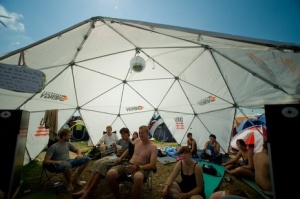
We were pleasantly surprised to meet such a bunch of enthusiastic, energy-optimising young people, so passionate and positive about their ideas. The real force behind their creativity partially came from the fact that they think it’s silly not to do something for the climate when it’s so easy and so obvious. What Julie and her friends at her camp had in common was that they thought, and think, in terms of effectiveness versus consumption of energy, and for them it’s all about optimising the resources you already have. The general feeling was that you don’t have to live in a hut of clay to save energy, and although there is not one simple, single solution to being more climate friendly, there is an attitude towards the effectiveness of energy that needs to be built in into people’s overall thoughts on energy and the climate.
Because of Julie and her friends’ camp, a friend of theirs was headhunted last year by Roskilde festival to help initiate ideas for the 2009 climate community this year, something Julie and the others thought was super cool. Julie and her friends will be back at Roskilde next year, only bigger and better, still by using the energy created by their camp. Keep your eyes open for them in 2010! 🙂

Some of you have asked if your clothes really will get clean at 30 °C. Well, if you follow these ten washing tips from ido30.org, you can’t go wrong.
Ten good washing tips to get optimal results:
- Use a detergent suited for low-temperature wash
- Keep the lid/door to your washing machine open between washes to avoid malodour in the machine
- Wash full loads but do not overload
- Wash at 60 °C once a month to keep machines clean
- Follow the guidelines from the detergent manufacturer regarding proper use and dosing. Remember to dose according to the water hardness in your area
- Make sure your washing machine spins your clothes at the right speed during the spin cycle, i.e. don’t spin at a low rate just because you are using a low temperature
- Use short cycles for clothes that are not dirty but just need to be refreshed
- Always wash bedding, diapers and cleaning rags at 60 °C
- Line dry your clothes outside
- Remove the wet laundry from the washing machine when the wash is finished. Avoid leaving wet clothes in the machine for too long
There you have it. Piece of cake, right?

With the scorching sun beaming down from a cloud-free sky, Mie, Dorthe and Agnes have plunged in to their paddling pool to cool down. And it’s not even midday.
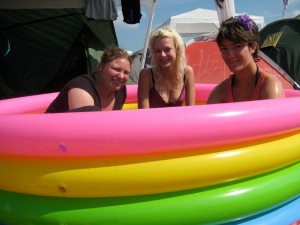
They were all thirteen when they learnt how to do the laundry. In Mie and Agne’s case, it was their mothers who took them under their spotless wings.
“I kept asking for clean clothes, until one day it got too much for my Mum, and it was then that I started to learn how to do the laundry”, remembers 21-year-old Agnes.
“It was my Granny who taught me to wash clothes. Not for any particular reason, but just because I was a teenager, and she thought that it was about time”, explains 19-year-old Dorthe.
Mie, 17, sits and splashes about in the water, and while at Roskilde, she longs for clean clothes. Unfortunately for Mie, she’s not always had the best of luck when it comes to doing the laundry.
“Hmmm, there was one time I was going to do a white wash, but I overlooked a red shirt, and of course…everything came out pink”, she sighs.

Ulrik, Samuel and Casper from Copenhagen don’t have so much to say about washing catastrophes, but they do have the time to put down their newspapers and have a chat about laundry, nonetheless.
Samuel was 17 when he learnt to wash clothes, but there was no mentor to help him; just the users-manual.
“Washing my clothes is a ritual – like when I take a shower. It’s all about feeling clean” he philosophises, ever though he admits he does have days when the ritual isn’t quite so important.
Casper claims, to resounding agreement from the rest of the camp, that he himself is pretty vain, especially when considering the fact that he’ll only wear a shirt once before throwing it in the wash, and even though his Mum taught him how to do the laundry 8 years ago, when he was just 15, she still remains his emergency helpline when it comes to laundry advice.
This is something that Ulrich would never do, as even though it was his Mum who taught him how to do laundry when he was 18, it was also her who shrunk his clothes – something he himself has never done.
They all wash at 30°, basically in order to save money, not really knowing that it also benefits the environment. With this new environmental knowledge, they straighten their backs, and a little proudly tell how they buy detergent specifically for washing at 30°, and cold washes.

Kristoffer from Amager was just 13 when his Dad dragged him towards the washing machine.
“It was and still is usually my Dad who does the laundry at home, so naturally it was him who taught me to wash clothes”, says Kristoffer.
At Roskilde, clean clothes aren’t so important for him, but when not at festivals, fresh laundry is definitely appreciated. However, the clothes don’t reach the machine until they get shoddy and smelly. Even when they do make it that far; they’re not separated.
“I just stuff it in all together. No accidents so far!” he smiles.

Marie-Louise and Luna both come from Hillerød, but have very different attitudes to washing. Marie-Louise is self-taught when it comes to laundry, and she has strong views on how clothes should be washed.
“Until very recently my Mum washed at 40° – until I told her it was a load of nonsense. Now she washes at 30°, and is perfectly content with it. 10 degrees more is just unnecessary. 30° is faster, and it gives the same results. ”
It’s also her Mum who is behind the only washing related accident, which has something to do with a pair of purple trousers ending up in what was meant to be a white wash…
Luna was taught by her Mum to wash clothes, but even though she’s been taught, it’s still her Mum who takes care of it at home. A situation which, perhaps, we’re all a little too familiar with…
Please leave a comment or send an email to info@ido30.org and tell us your worst washing experience.
Is the current focus on the climate just a ghost left over from Bjørn Lomborg’s (a Danish professor and author, opposed to the Kyoto Protocol, who made headlines with his seriously skeptic views on all things environmentally friendly) days, a doomsday-obsessed media stunt, or a subject that really ought to be taken seriously?
The heat of the debate varies widely at this year’s Roskilde Festival, so we took the opportunity to find out how the festival’s visitors feel; does the subject make them steaming mad, or do they give it the cold shoulder?
Pernille sits weary and alone back at her camp, keeping watch over things. She considers herself as ‘climate conscious’, but is quick to point out that she’s not fanatical. Her interest in the climate grew after hearing Bjørn Lomborg’s opinions on global warming. She decided to take things in to her own hands, and began to research what was hot and what was not, in the never-ending climate debate.
“I probably should do more, or join an organisation or something,” she says, adding immediately that she does watch her energy and water consumption every day; something which is important to her. “It’s really now that we should be attentive to what’s going on, because pretty soon we’re going to see some serious consequences.”
In another camp, pink tulle hangs from the tents in ‘the notorious tulle-camp’, and in the shade under the garden pavilion, all this climate talk is being, well, talked about.
“It’s all hype,” is the general consensus. “Everything that’s going on now is all part of nature. The average temperature, and water level have both been higher in the past than it is now.” In their view, it’s not something that really deserves a great deal of thought. They might, if reading an article concerning the environment, give the matter a seconds thought, but it’s quickly forgotten, as it now just blends in with all the other ‘climate talk’, not to mention the guilt inducing finger pointing.
“I don’t think that it effects us on a day-to-day basis,” the tulle-camp claim. “Of course you can buy environmentally friendly products, but if they’re more expensive, then I don’t want to. Just like I don’t turn the tap off when I brush my teeth.”
Ida and Jakob are dedicated festival-goers despite their young age. Even though Ida has been affected by the views of her parents, it was six years ago that she first really became aware about the climate, a subject that in her opinion should be prioritised by politicians who make far too many hollow promises.
At Jakob’s house, the subject has never really been something that was talked about, but now he makes conscious choices every day, particularly concerning energy. As far as he’s concerned, just one person can make a difference simply by buying local produce, environmentally friendly products, and by avoiding mass-produced products.
“The climate problem can become a much greater problem than it is now,” says Jakob, “which is precisely why it’s so important to nurture a culture which is really climate aware.”


